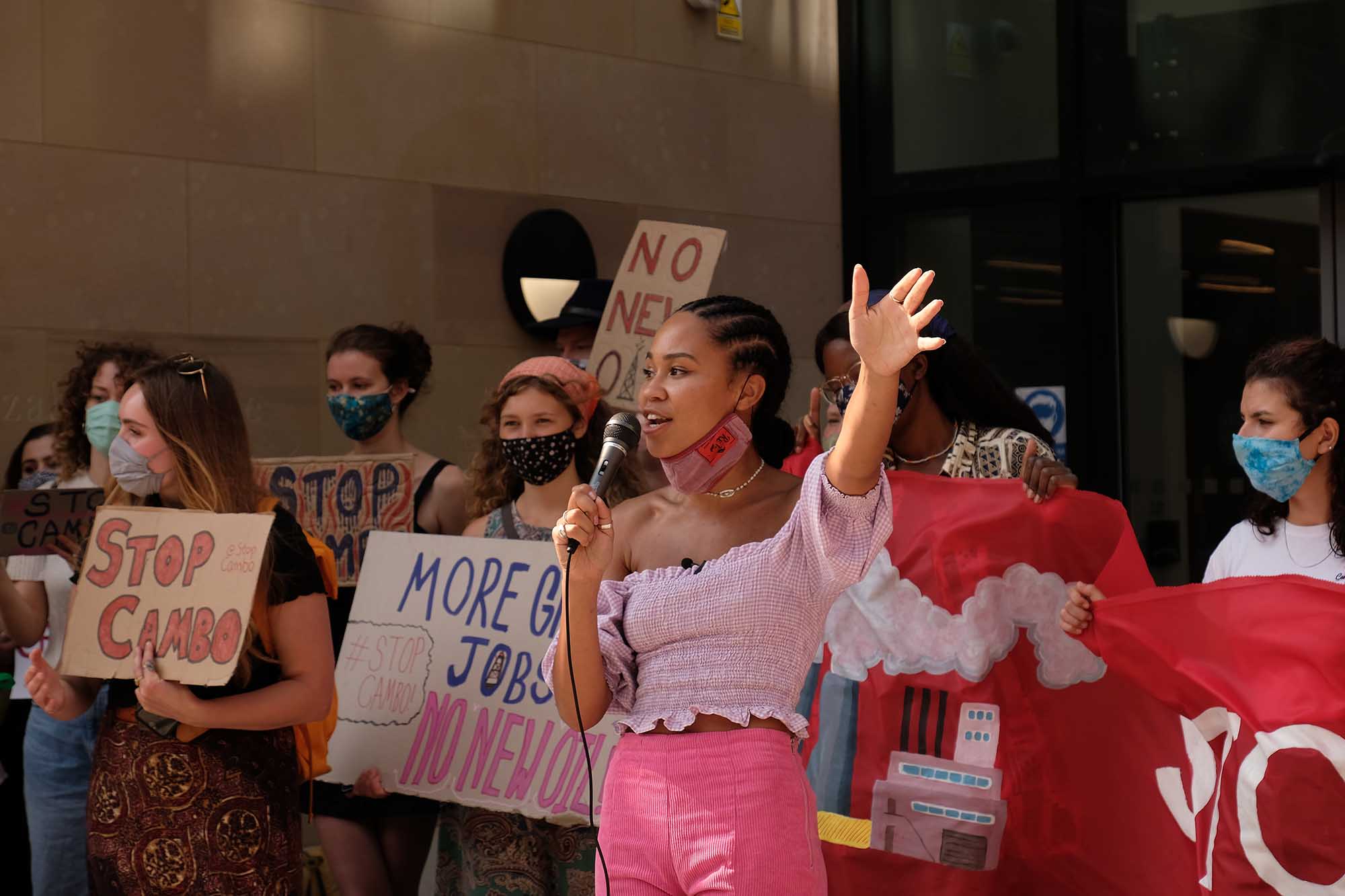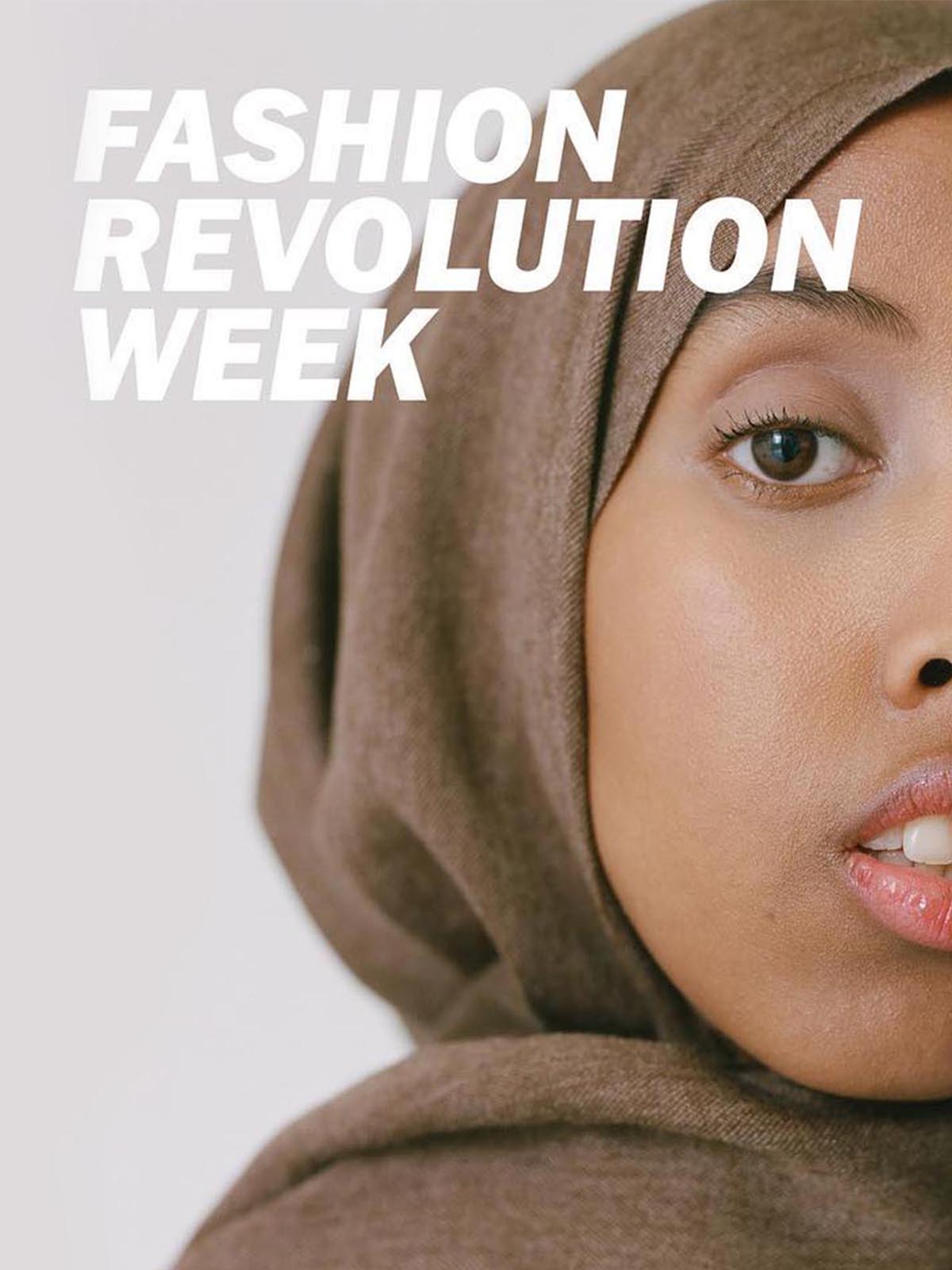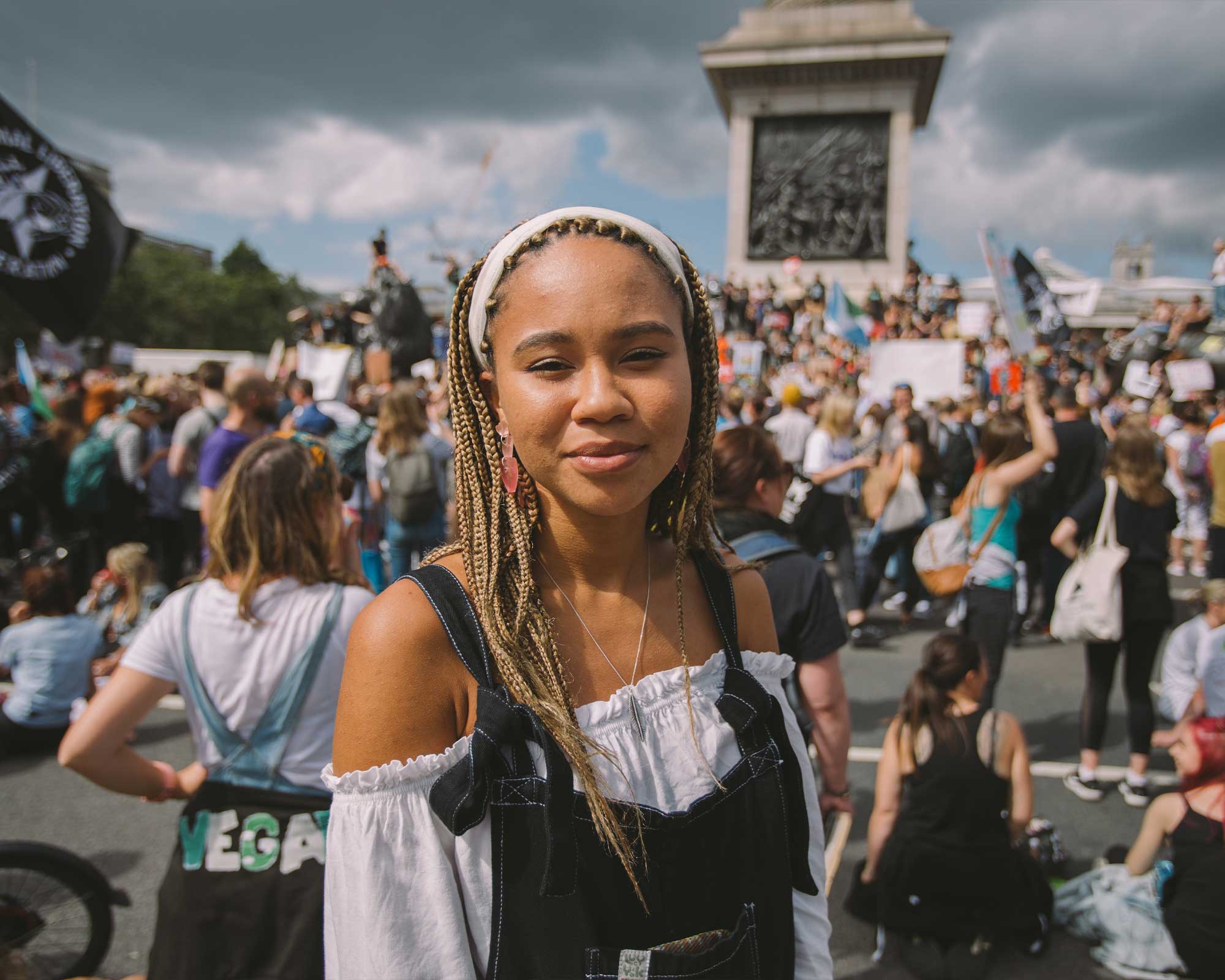How do you get into climate activism? We ask Mikaela Loach in our latest Q&A feature, where she digs into fast fashion, direct action, and finding your place in the climate justice movement.
Meet Mikaela Loach, climate justice activist
Activist Mikaela Loach broke up with fast fashion several years ago. Since first learning about the industry’s harms by watching “The True Cost” documentary, she’s earned a reputation for speaking out about the big brands’ lack of urgency to address their impacts on people and planet. But that’s only where her activism begins.
A medical student based in Edinburgh, Scotland, Loach is one of the most prolific young voices in the broader fight for climate justice. She’s locked herself in an arm tube in front of the UK’s Department for Business, Energy and Industrial Strategy in a headline-grabbing protest against oil and gas subsidies. She’s built a community of more than 100,000 people across social media, where she aims to make getting into activism more accessible. And most recently, she’s one of three claimants taking the British government to court over fossil fuel extraction in the North Sea.
Her goal: highlight where the climate emergency intersects with white supremacy, colonialism, and labour rights. “‘I’m going to tell you why ‘we’ did not cause the climate crisis,” says Loach on one of her recent Instagram videos. “When just 100 companies are responsible for 71% of industrial greenhouse gas emissions since 1988, and the world’s richest 1% of the population produces more than double the emissions of the poorest half of the world, ‘we’ did not cause the climate crisis. Systems caused it. Capitalism caused it. White supremacy caused it.” That more or less sums up her philosophy.
As world leaders gathered in Glasgow, Scotland, for the United Nations Framework Convention on Climate Change, we spoke to Loach about how to get involved in the climate justice movement; her own journey into direct action, and the scoop on her new docuseries, “ReDress the Future”.

9 Q&As on direct action and fast fashion
1. Q: You certainly have not let the pandemic slow you down. You’ve released dozens of episodes of your podcast, launched a docuseries on streaming service WaterBear (dubbed the “Netflix for climate documentaries” by British Vogue), and recently became a claimant on a lawsuit against the UK government. Can you tell us a little more about why you’re taking the government to court?
A: For a few years, I’ve participated in direct action around the huge amounts of subsidies the UK government gives to the oil and gas industry. In October 2019, I joined activists from Scotland in blocking the entrance roads outside of the Department for Business, Energy and Industrial Strategy. Our site was called “Power In Truth,” and it was all focused on these subsidies—telling the government they shouldn’t be in bed with the fossil fuel industry. I chained myself to an arm tube and put myself at risk of arrest. It was very stressful and scary. It very much felt like a last resort activity.
But obviously, it’s almost two years later and those subsidies are still being paid. Nothing really seems to be changing. I heard about this court case, reached out and asked how I could be involved. There are two other claimants on the Paid to Pollute case: Kairin van Sweeden who lives in Aberdeen and Jeremy Cox, a former oil worker. The case is about the subsidies, which have given billions of pounds of public money to fossil fuel companies and make the North Sea the most profitable place to extract oil and gas. This does not line up with the government’s commitments to reach “net zero” carbon emissions by 2050. This does not mean extracting as much as possible before 2050. We need to be decreasing emissions now, and that means no new oil and gas extractions.
We’ll be going to court on the 8th of December. It feels kind of weird and scary in many ways. I don’t take it lightly. Taking the government to court is a very serious thing. But I think all of us are desperate. We’re tired of the fact that these companies are not only getting away with this, but paid to do it.
2. Q: You’re a really inspiring role model to many young climate activists, but I’d like to wind the clock back a bit and hear about where your journey began: What were your first steps into advocacy and direct action?
A: It was a bit of a roundabout journey. I was born in Jamaica, but I grew up in the UK in very majority white spaces. I was aware of racism, difference, and white supremacy from quite a young age. My parents brought us up watching documentaries about the Maroons—Jamaica’s freedom fighters—and about the civil rights movements in the UK and the US. That taught me about how change has happened over time through movements of people.
As I got a bit older, I got involved with migrant rights. This was my first experience organising with groups supporting refugees. I was also becoming increasingly concerned about the climate. I think a lot of young people are worried about this huge crisis that’s happening that we feel we didn’t cause in the same way as prior generations. We’re told that we should change our lifestyle—boycotting fast fashion, eating vegan, walking everywhere, taking public transport, and all these individual choices.
Eventually, my organising experiences led me to climate justice. I realised that my work in refugee rights and anti-racism was inherently connected to the climate. And through the lens of climate justice, that meant organising, movement building, and collective action for justice. That’s when I really got into direct action with groups like Extinction Rebellion and Climate Camp Scotland.
3. Q: Climate justice is a term some activists worry has lost a bit of its potency as it’s been misappropriated by people in power. What does it mean to you?
A: Climate justice means that we can not only tackle climate collapse, but we can also create a better world for all of us that tackles white supremacy at the core, that tackles all these interconnected injustices at their core. A lot of us feel like we’re in last resort territory, and we need to take drastic action on these issues.
Climate justice means that we can not only tackle climate collapse, but we can also create a better world for all of us that tackles white supremacy at the core, that tackles all these interconnected injustices at their core.
4. Q: Let’s talk about the connection with fashion. On “The YIKES Podcast” and in your writing, you’ve talked about the many negative impacts of fast fashion. How has your personal relationship with clothes evolved over the past few years?
A: I started boycotting fast fashion and learning a lot more about the industry and the harm it’s caused after watching “The True Cost” documentary. That was hugely transformative for me, as I believe it’s been for a lot of people. There’s a line in it that Orsola de Castro says: “Clothes are our chosen skin.” It reminded me of a proverb in the Bible: “She is clothed with strength and dignity.”
I started wondering, am I clothing myself in strength and dignity if the clothes I’m wearing have harmed the people who are making them, if they’ve exploited the majority of women of colour all over the world who make them? Am I being clothed in dignity or am I being clothed in the oppression of other people in order to make myself feel empowered?
That was a big realisation of how connected the fashion industry is to systems of colonialism and white supremacy, and how we are allowing that in the way that we continue to prop up these industries. It really got me to care more about fashion. It actually made me kind of more excited about the clothes that I’m wearing, because if I know that they come from a place of respect and of goodness and of real empowerment, then I feel more excited about them.
5. Q: “The True Cost” is an excellent place to start. What else is on your beginner’s guide to advocacy list?
A: After “The True Cost,” which is a really motivating rallying call, I’d check out a great podcast called “Remember Who Made Them” by Venetia La Manna and a couple other really incredible fashion experts. The whole podcast was started to fund and give reparations to garment workers who have lost out on payments through the pandemic.
If you go on Fashion Revolution’s website, they’ve got tons of blogs that are about all of these different issues and explain them really well.
6. Q: We, obviously, have to include “ReDress the Future,” your new free to stream docuseries. What’s the gist?
A: Of course, of course [laughs]. “ReDress the Future” is a great next step for people who’ve engaged with these issues before. Maybe they’ve watched “The True Cost” and know a bit more about these things. We’re more talking about solutions rather than the problem.
Looking at sustainable fashion and the lifestyle changes we can make for the planet, what that means is that we need to move from “sustainable for me” to “sustainable for we”.
7. Q: Thinking about solutions, the debates around sustainability too often focus on this false dichotomy between individual choices and systems change. You’ve spoken about the need for both. How do you think about that tension within your advocacy work?
A: I think the problem in the debate is that there’s too much of a focus placed on individual action disconnected from collective change. Obviously, individual actions are a part of the collective system change. But I was on a panel with Bill McKibben recently and one thing he says really illustrates this point. He says that we need individuals to be less of an individual and more of a collective. If the actions you’re taking as an individual are helping to build something better for the collective, then that’s really helpful.
8. Q: That’s a really important point in sustainable and conscious fashion. How do you link that idea to a space that sometimes feels exclusionary to a lot of people?
A: Looking at sustainable fashion and the lifestyle changes we can make for the planet, what that means is that we need to move from “sustainable for me” to “sustainable for we”. If you can go “zero waste” yourself because you have more time privilege or financial privilege, but there are people in your local area who can’t make those same choices because of those reasons, then maybe think about how you can make this action more accessible for your community. Ask, how can we do this together? Because actions aren’t truly sustainable unless as many people as possible can participate in them. That’s where we can go beyond activities that can be ego-fueling and actually do good for the collective.
9. Q: The climate emergency can feel really overwhelming. A lot of people might wonder where they can get started in working toward the collective good. Do you have any tips for how someone can figure out where their skills and talents can make a difference?
A: This is something I hear a lot, so we did a whole episode on “The YIKES Podcast” focused on the different roles in movements. I’d recommend that folks listen to that to get started.
I’ll emphasise that I’m not motivated by despair. I don’t think any of us are sustainably motivated by despair. In order to work out what you should be doing, you need to find that spot that not only makes your heart shatter and break but also makes your heart want to beat out of your chest because you’re so excited by the idea of changing that thing. For me, that’s what climate justice is. It’s not actually just about the heart-shattering stuff. I’m motivated by overturning the systems that have caused harm for so long and refusing to allow them to persist.
I think that everyone needs to fight for what makes you so excited that you can’t not do it. Sometimes people will be like, oh it’s so brave what you’re doing. And like, it’s actually not. I just simply cannot not be doing this. And we need everyone to be at that place.
Author bio:
JD Shadel is a London-based journalist, editor, and strategist, whose writing appears in The Washington Post, Condé Nast’s them., VICE, BBC News, Bloomberg, and many other outlets. Their work often centres on issues of justice and the experiences of LGBTQ+ people. In 2017, VICE editors named their reporting on historical queer activism among the “Best Writing of 2017″, and they’ve played leading roles in projects and publications honoured by the U.S. Travel Association and the Webby Awards. At Good On You, JD serves as Head of Content, building on their decade of experience in community-driven digital media and a lifetime of second hand shopping. (Author photo by Celeste Noche.) Find them on Twitter and their website.


















